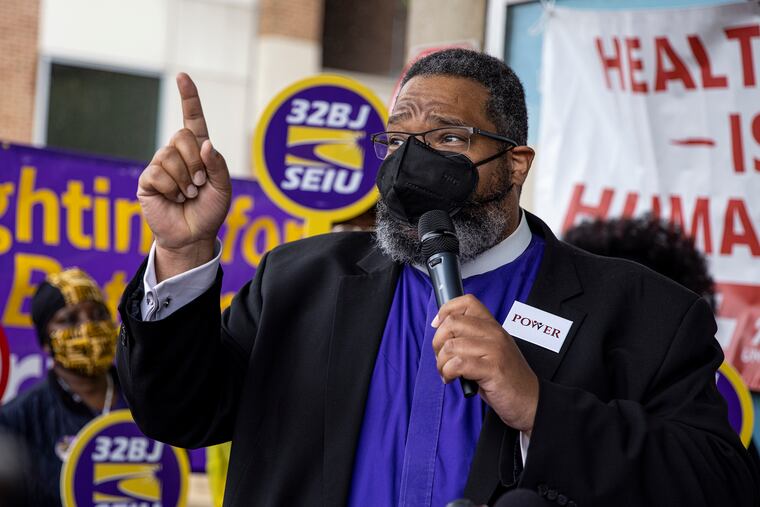Philly’s airport workers need higher wages and health benefits | Opinion
The frontline workers at PHL who served American Airlines and other carriers during the pandemic need a recovery plan, too.

This Thursday, Philadelphia City Council will take a vote that will impact the health and lives of thousands of Black and brown essential frontline workers at Philadelphia International Airport.
The frontline workers at PHL who served American Airlines and other carriers during the pandemic, whose hands built this industry recovery, need a recovery plan, too. Most airport workers are African American and immigrant workers who live in Philadelphia’s working-class and working-poor neighborhoods. They faced disproportionate hardship during the pandemic. Hundreds of these workers at PHL lost their jobs. Those who continued working risked grave exposure to COVID-19 — and the overwhelming majority of them worked without private health insurance since the plans offered are too expensive for these low-wage workers to afford. These same workers have now gone over a year without a raise.
» READ MORE: Philly City Council presses ahead with benefits bill for airport workers after American Airlines seeks delay
Airlines’ losses were cushioned by generous bailouts from taxpayers. American was authorized to receive some $12 billion in grants and another $7.5 billion in loans, more than any other airline. The New York Times estimated that the first round of airline bailouts alone cost taxpayers an average of $300,000 per job saved. The cost to taxpayers is even greater when compounded by airport workers who need to seek public benefits like Medicaid and SNAP to survive. Why are airlines comfortable demanding swift action from the federal government to bail them out, while insisting city government slow down action on behalf of the Black and brown essential workers airlines needed to survive the pandemic?
Anyone familiar with airlines’ histories at PHL and other airports should be deeply concerned by such a request. In the decades before Council passed the 21st Century Minimum Wage, airlines could have raised worker standards at the airport. They did not. Throughout the pandemic, airlines could have insisted their contractors provide affordable health care, enough sick days, or hazard pay. They did not. If Council waits until airlines are “ready” to give workers what they deserve, they will be waiting a long time.
The era of corporate profit built on the poverty wages of essential Black, brown, and immigrant workers at our nation’s airports must end. The ravages of the pandemic revealed the human costs of failing to protect the welfare of our country’s essential workers. The raises contemplated in this bill are in step with policies enacted by airports across the country.
» READ MORE: Hundreds of American Airlines flight attendants are losing jobs at Philadelphia International Airport
This month, Baltimore/Washington International Airport enacted a policy that increases compensation by up to 58% in the first year, putting workers on a path to $17 per hour in total compensation. This year, Newark airport enacted a health benefits standard like this bill would create, joining airports in Fort Lauderdale, Fla., Los Angeles, Miami, New York, Oakland, Calif., St. Louis, San Francisco, and San Jose, Calif. in mandating health benefits for airport workers. This bill would ensure workers at PHL do not fall further behind their peers in other cities.
While American has received billions in bailout money with more on the way, only the action of City Council can secure a future for workers and their families at PHL. For that reason, Councilmembers Mark Squilla, Jamie Gauthier, Curtis Jones, Bobby Henon, Maria Quiñones-Sánchez, Cindy Bass, Cherelle L. Parker, Kendra Brooks, Katherine Gilmore Richardson, Helen Gym, and Isaiah Thomas, alongside Council President Darrell L. Clarke, are cosponsors of this bill.
We urge all of Council to join us, and not delay in passing this bill and ensuring that airport workers — who endured the worst of the pandemic — share in the airlines’ recovery.
Bishop Dwayne D. Royster, a leading voice in modern faith-based activism, is a pastor, political activist, radio show host, writer, and public speaker, executive director of POWER, and the founder of Society for Faith and Justice. Kenyatta Johnson represents Philadelphia’s 2nd Council District, which represents more than 150,000 residents in the neighborhoods covering parts of Center City, South and Southwest Philadelphia, and includes the sports stadium area, Philadelphia International Airport, and the Navy Yard.